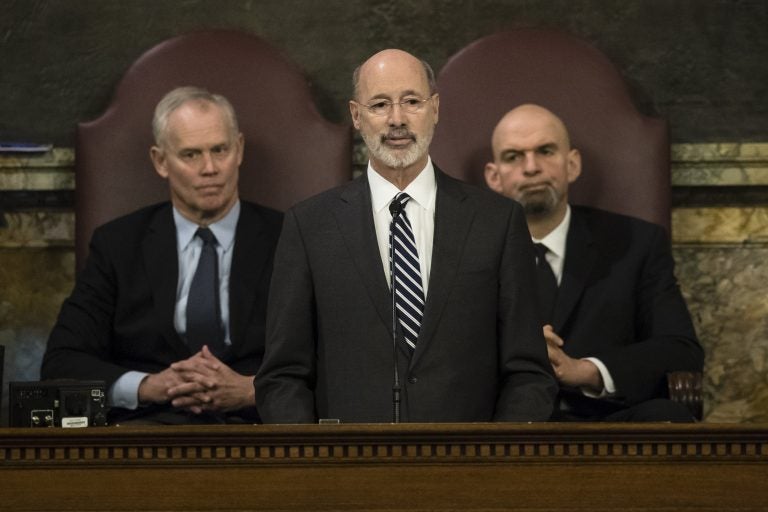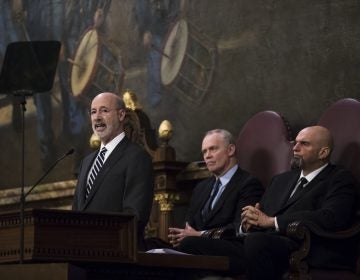Wolf’s plan to boost teacher salaries faces bipartisan skepticism in Pa. House
Legislators questioned the practical implications of the proposal, warning that it could cost more than the administration predicts.

Democratic Gov. Tom Wolf delivers his budget address for the 2019-20 fiscal year to a joint session of the Pennsylvania House and Senate in Harrisburg, Pa., Tuesday, Feb. 5, 2019. House Speaker Mike Turzai, R-Allegheny, and Lt. Gov. John Fetterman is at right. (Matt Rourke/AP Photo)
Lawmakers from Pennsylvania’s powerful House Appropriations Committee cast doubt on the fate of Governor Tom Wolf’s proposal to set the state’s teacher-salary minimum at $45,000 a year.
That message rang clear in a Monday budget hearing for the state’s education department. Legislators questioned the practical implications of the proposal, warning that it could cost more than the administration predicts and that it would unduly favor rural districts that already get a disproportionate per-pupil share of state dollars.
“When we look at the $45,000, where is it going?” said State Rep. Stan Saylor, R-York, the committee chair. “It’s not going to those areas that are in need of funding. It’s going to areas that are already, some people would say, overfunded.”
Wolf wants to raise the minimum teacher salary from $18,500 a year to $45,000. There are no teachers who make the minimum, and the average Pennsylvania instructor gets about $67,000 a year.
But there are 3,200 school staffers across 180 districts that do make less than $45,000.
Wolf wants to raise their yearly pay and cover the difference with state money. His administration estimates the hike would cost about $14 million a year, a total that includes salary and benefits.
Wolf framed the increase as a moral imperative in his February budget address.
“Classroom teachers have too often been getting the short end of the stick,” he told the General Assembly.
Several Republican legislators, though, worry that a bump in minimum pay will trigger other increases that will fall on the backs of local taxpayers. They imagine that in districts where new teachers see their salaries go up, veteran teachers will also expect to make more.
“I am concerned with that ripple effect,” said Rep. Jim Struzzi, R-Indiana. “Someone’s going to have to come up with the money to cover those additional salary increases.”
Other GOP lawmakers believe Wolf’s proposal will simply benefit districts already advantaged by the state’s funding scheme.
Because of a policy known as “hold harmless,” many shrinking, mostly rural school districts in Pennsylvania receive a greater share of state money than objective factors, such as enrollment, would predict. The state began to correct this through a new funding formula, but it only applies to new education dollars — a small fraction of the whole.
Most of the teachers receiving less than $45,000 a year work in rural districts.
“I’m looking at the districts getting the dollars and they seem to be the districts losing population and therefore losing students,” said Rosemary Brown, R-Monroe, a county where population has grown.
That message resonated across the aisle.
Donna Bullock, D-Philadelphia, supported the idea behind the Governor’s proposal, but said she’s “conflicted” about putting it into practice.
“I’m struggling a little bit with how to do this in a fair and equitable way,” Bullock said.
Education Secretary Pedro Rivera said the proposal isn’t “geographically driven” and that administration officials don’t view it as a giveaway to rural districts. They believe the policy will ensure teachers make a fair wage and allow districts to compete better for the best teachers.
While expressing skepticism about the proposal, Rep. George Dunbar, R-Westmoreland, mentioned that his daughter made more than $45,000 as a new teacher in Maryland.
“The governor wants her back,” said Rivera.
“So do I,” Dunbar quipped.
Maryland teachers, on average, make slightly more than Pennsylvania teachers, according to the National Education Association. Both states rank among the top ten in average teacher salary.
Policy potpourri
Monday’s wide-ranging budget hearing covered plenty of other topics.
On the funding front, several Democrats wondered why the governor hadn’t earmarked any dollars for PlanCon, the state’s system for aiding school districts with construction costs.
Lawmakers eliminated the line item for PlanCon in 2015 during a prolonged budget battle and have yet to restore it. That’s a sore spot for minority chairman Matt Bradford, D-Montgomery.
“These are needs that have to be met,” Bradford said.
Pennsylvania used bond financing to cover existing projects and has put a moratorium on new ones.
Leanne Krueger, D-Delaware, said “school facility needs are urgent” and pushed the administration to lift the moratorium on new projects.
Funding for cyber charters also emerged as a bipartisan concern.
Steve McCarter, D-Montgomery, and Clint Owlett, R-Tioga, questioned the amount of money districts send to cyber charters under the current arrangement. Owlett said the cost of cyber charters is “probably the biggest conversation that comes up with all of our school districts.”
“It’s an unsustainable model at this point,” he said, echoing the skepticism of some other lawmakers who believe cyber charters are a fiscal drain on traditional districts.
One of those skeptics is Rep. Curt Sonney, R-Erie, the new head of the House Education Committee.
Right now, districts send money to cyber charters for each resident who attends a cyber school. That payment is based on the district’s per-pupil expense and is the same for students attending brick-and-mortar charter schools.
Critics believe that’s too high a toll, and cite lackluster state test scores as proof that cyber charter don’t deliver sufficient bang for their buck.
Cyber charter defenders say those scores reflect the fact that they work with students who’ve struggled in traditional settings. They believe a change in funding will restrict school choice for the families that need it most.
Officials from the Pennsylvania Department of Education will be questioned by the Senate Appropriations Committee on Tuesday morning.
WHYY is your source for fact-based, in-depth journalism and information. As a nonprofit organization, we rely on financial support from readers like you. Please give today.






